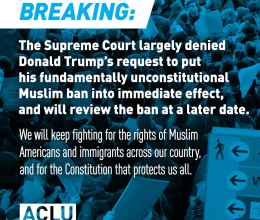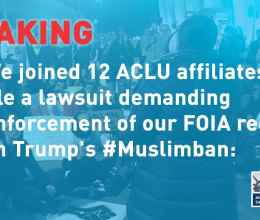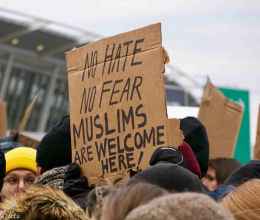This list illustrates the ACLU's work to defend the rights of those who practice a non-Christian religion or no religion at all.
ACLU and the ACLU of Southern California (2007) filed suit on behalf of Jameelah Medina, a Muslim woman who was forced by local deputies to remove her religious head covering while she was in custody in San Bernardino County's West Valley Detention Center. Despite her repeated requests to keep her head covered during her day-long incarceration, Medina was forced to remove her hijab in the presence of men she did not know and to remain uncovered for much of the day. More on the case.
ACLU of New Mexico (2007) represented four Muslim football players in their religious discrimination suit against New Mexico State University. The players received a favorable settlement after the ACLU of New Mexico argued in federal court that the University's head football coach violated the players' religious freedom rights by repeatedly asking them questions about al Qaeda, removing them from the University's team, and requiring all players to recite the Lord's Prayer at the end of each practice.
http://sports.espn.go.com/ncf/news/story?id=2204478" target="_blank"> More on the case.
ACLU of North Carolina (2007) won its lawsuit against the state of North Carolina to permit witnesses at trial to take oaths on the religious scriptures of their own religious beliefs (in this case Islam) rather than on those approved by the state. More on the case.
ACLU of Southern California (2007) represents Calvin Chee Keong Lee, a Buddhist-Taoist conscientious objector who enlisted in the U.S. Army shortly after arriving in the United States from Malaysia. Currently stationed in Ft. Irwin, California and scheduled for imminent deployment to Iraq, Lee sought discharge from the Army based on his religious beliefs, which compel him not to kill or cause injury to others. When he enlisted, Lee believed that he would be able to remain in his civilian construction job. More on the case.
The ACLU (2007) argued that veterans and their families should be able to decide for themselves which religious symbol is placed on a deceased veteran's headstone at federal cemeteries. The ACLU challenged the constitutionality of a U.S. Department of Veterans Affairs policy that had restricted religious symbols only to those that had been approved by government officials. The Department of Veterans Affairs settled the case by agreeing to allow a Wiccan five-pointed star encased in a circle included on the plaintiffs' loved ones' military headstones. (The ACLU has frequently, and inaccurately, been accused of attempting to eliminate religious symbols from federal cemeteries. To the contrary, the right of veterans and their families to choose how to represent their beliefs belongs to them and not the government.) More on the case.
ACLU of West Virginia and the ACLU of the National Capital Area (2007) represented a Muslim Iranian-American couple, both of whom were terminated from the National Institute for Occupational Safety and Health (NIOSH) because of their religion and without due process. The ACLU negotiated an agreement with NIOSH under which the husband and wife were reinstated to their previous positions with back pay, benefits, and damages. More on the case. View a slideshow.
New York Civil Liberties Union (2007) successfully brought suit on behalf of a Muslim prison guard who was told that he had to remove his head covering (known as a kufi), while working, even though he had worn it while on duty for many years. A federal judge ordered the New York Department of Corrections to allow the guard to wear his head covering on the job again. More on the case.
ACLU of Alabama (2007) represented Native American inmates in their successful religious liberty suit requiring the state of Alabama to permit sacred sweat lodge ceremonies at designated correctional facilities on holy days. After winning that case, the ACLU of Alabama represented some of the inmates again when the State attempted to transfer them to a correctional facility in Louisiana that does not allow such religious ceremonies.
ACLU of Delaware (2007) prevailed in a lawsuit brought on behalf of Christians, pagans, and Wiccans, alleging that a department store violated a Delaware public accommodations law by canceling community courses after individuals complained about the religious beliefs that were being taught in the centers.
ACLU of Georgia (2007) wrote a letter to the Centers for Disease Control and Prevention on behalf of a Sikh physician. The doctor had been instructed that he must, contrary to his religious beliefs, shave his beard and remove his turban in order to work at the Public Health Commissioned Corporation of CDC. After receiving the ACLU of Georgia's letter, the CDC implemented a new, individualized process for requests for religious exemptions that creates a general presumption in favor of religious accommodation.
ACLU of the National Capital Area (2007) brought suit on behalf of Christian, Muslim, and Jewish firefighters and paramedics who wear beards as a matter of religious observance. The U.S. District Court for the District of Columbia agreed with the ACLU that the District of Columbia's policy prohibiting these individuals from wearing beards violated their religious freedom rights. More on the case.
ACLU of West Virginia (2007) brought suit challenging a company's refusal to permit one of its employees to wear a skirt to work. The employee's religious beliefs prohibited her from wearing trousers. The employer refused to accommodate these beliefs despite the employee's offer to pay for a uniform skirt with her own funds. More on the case.
ACLU of Missouri (2007) sent a letter to the Kansas City Water Department demanding that a Muslim employee be permitted to attend Friday prayers. The Department responded by extending the employee's Friday lunch to accommodate her religious observance.
ACLU of Nevada (2007) appeared before the Nevada Equal Rights Commission (NERC) and the EEOC on behalf of a Jewish Orthodox employee of the Las Vegas Metropolitan Police Department whose request to wear a trim beard and yarmulke while at his non-uniform, desk job was denied. When the Department still refused to grant the employee a religious accommodation, the ACLU brought suit in federal court.
ACLU of Virginia (2007) filed a complaint under the Religious Land Use and Institutionalized Persons Act challenging a Virginia Department of Corrections policy requiring inmates to be clean-shaven and to keep their hair short. The policy infringed on the beliefs of Muslim and Rastafarian inmates who have religious objections to cutting their hair. More on the case.
ACLU of New Jersey (2007) filed a religious discrimination case on behalf of a Muslim student who otherwise had to choose between following his religious beliefs that forbid him from entering buildings with foreign religious symbols and attending his public high school graduation that was scheduled to be held in a church. The ACLU argued that the school's decision unlawfully forced the student to choose between attending his graduation and violating his religious beliefs. (This case illustrates the same principle as the ACLU of Idaho (1980) case cited above that was brought by Christian parents who did not want their high school children to attend graduation held at a Mormon church.) More on the case.
ACLU of Louisiana (2007) filed a Religious Land Use and Institutionalized Persons Act claim in federal court after the David Wade Correctional Facility refused to permit a Muslim inmate to receive a religious newspaper. More on the case.
ACLU of Massachusetts (2007) represents a Muslim man who lost his job with a communications contractor at the State Police headquarters for unspecified reasons (but presumably because he is Muslim). When the State Police Information Officer responded with highly redacted documents showing the real reason for the termination, the ACLU of Massachusetts filed an administrative appeal.
ACLU of Southern California (2007) filed claims under RLUIPA, the First Amendment, and several state law provisions on behalf of Souhair Khatib, a practicing Muslim woman who was forced to remove her hijab, a religious headscarf, when taken into custody at an Orange County courthouse holding facility. In accordance with her religious beliefs, Mrs. Khatib wears her headscarf whenever she is in public or in the presence of men who are not part of her immediate family, and she does not permit any physical contact with men who are not her immediate relatives. More on the case.
ACLU of Maryland (2006) urged Howard County school officials to retain a school policy permitting Muslim students excused absences, such as those allowing students to leave for doctors' appointments and religious holidays, for prayer on Fridays. More on the case.
ACLU of Southern California (2006) filed suit on behalf of a Vietnamese Buddhist Temple (Quan Am Temple) against the City of Garden Grove and its officials for violating the congregation's First Amendment rights to free religious exercise and the Religious Land Use and Institutionalized Persons Act of 2000. The lawsuit challenges the constitutionality of the City's zoning codes, as well as the City's application of the zoning codes to Quan Am Temple. A federal judge issued a preliminary ruling requiring the City to allow "the Temple, the Abbot, and his congregation [to] peaceably practice their Buddhist faith at the Chapwood Property immediately." More on the case.
ACLU of Massachusetts (2006) helped a Rastafarian baggage screener wear his hair in accordance with his religion. The screener had been employed for three years by the Logan Airport for the Transportation Security Administration. The ACLU filed a complaint before the Equal Opportunity Employment Commission defending his religious rights.
New York Civil Liberties Union (2006) filed a federal lawsuit in Manhattan defending the right of people wearing religious head coverings not to have them removed for identity photos. The case was brought with the New York University Law School Civil Rights Clinic against a Coast Guard regulation denying merchant marine licenses to those who would not remove the coverings for photographs. More on the case.
ACLU of Virginia (2006) filed a friend-of-the-court brief supporting an inmate's allegation that the Virginia Department of Corrections violated the Religious Land Use and Institutionalized Persons Act (RLUIPA) by refusing to provide him with meals consistent with his religious beliefs. More on the case.
ACLU of Nebraska (2006) brought a free exercise claim on behalf of followers of the Church of Scient ology who alleged that Nebraska's mandatory testing of newborn infants for metabolic diseases violated their religious liberty by preventing them, as new parents, from exercising their belief that a newborn should be kept quiet and serene during the first days of life.
New York Civil Liberties Union (2005) filed a federal lawsuit to stop the Department of Homeland Security from enforcing a policy of detaining, interrogating, fingerprinting, and photographing American citizens at the border solely because they attended Islamic conferences. More on the case.
The ACLU of New Mexico (2005)represented Muammar Ali, a Muslim football player for New Mexico State, who was released from play following repeated questioning about al-Qaeda. More on the case.
The ACLU of North Carolina (2005) filed a lawsuit challenging the state's practice of refusing to allow non-Christians from taking an oath in court using a religious text other than the Bible. More on the case.
In response to a lawsuit filed by the ACLU of Colorado (2005), the Department of Corrections agreed to resume providing kosher meals to Timothy Sheline, a Jewish prisoner, whose kosher diet was revoked for one year as punishment for allegedly violating a dining hall rule by taking two packages of butter and two packages of salad dressing and placing them in his pocket to remove them from the dining hall. More on the case.
The ACLU of Pennsylvania (2005) sued on behalf of a devout Muslim firefighter, Curtis DeVeaux, for suspending the Muslim for refusing to shave his beard as required by city regulations. More on the case.
The ACLU of Wisconsin (2005) filed suit on behalf of Cynthia Rhouni, a practicing Muslim woman, who was required to remove her headscarf in front of male prison guards in order to visit her husband at the Columbia Correctional Institution. Ms. Rhouni offered to remove her headscarf and be searched by a female guard, but the prison would not accommodate her request and respect her religious belief that her head should not be uncovered in the presence of unrelated males.
wi.org/wisconsin/religious_liberty/20050525rhounipressrelease.shtml" target="_blank">More on the case.
The ACLU of Northern California (2005) filed a lawsuit in federal court challenging restrictions on an asylum seeker's right to wear a religious head covering. The plaintiff, Harpal Singh Cheema, is a devout Sikh, imprisoned since 1997 while awaiting a decision on his asylum application. The Sikh faith requires men to cover their heads at all times, but Yuba County jail authorities will not permit Mr. Cheema to leave his bed with his head covered. More on the case.
The ACLU of New Jersey (2005) settled with the New Jersey Department of Corrections on behalf of Patrick Pantusco, an inmate who practices Wicca who was denied religious books and other religious items while in prison. Persons of other religions were permitted to obtain religious books and items specific to their religious practice. The prison's denial of Mr. Pantusco's requests was based on the fact that the prison refused to recognize Wicca as a legitimate religion. In the settlement, the state agreed to permit Mr. Pantusco access to all requested items and pay damages. The case is Pantusco v. Moore, et al. (D.N.J.). More on the case.
The ACLU of Washington (2005) represented The Islamic Education Center of Seattle, which was denied a conditional land use permit by the city of Mountlake Terrace. The Center is a small nonprofit membership organization founded primarily by Farsi-speaking (Iranian & Afghani) Muslims living in the greater Seattle area. It holds prayer services on Friday and Saturday evenings, sponsors educational programs like poetry reading and language training, and holds various cultural and traditional observances. The City denied the Center's land use permit even though the property next door to the Center was a Christian church that had received a similar permit. With the aid of the ACLU, the Center was eventually awarded the necessary permit to allow it to operate. More on the case.
The ACLU of Nebraska (2004) filed a suit against the city of Omaha on behalf of Lubna Hussein, a practicing Muslim woman who wears a headscarf and long sleeves for religious reasons, who was twice denied entry to Deer Ridge pool property to watch her children swim for refusing to wear a swimsuit. She did not intend on entering the pool to swim. The city has since changed its policy allowing for medical and religious exceptions to the swimsuit policy. More on the case.
The ACLU of Virginia (2003) represented and filed suit on behalf of Cynthia Simpson, a Wiccan who county leaders refused to add to a list of religious leaders who could be invited to offer invocations at meetings of the Chesterfield County board of Supervisors. The reason given for refusing to add her to the list was that her religion was not of the Judeo-Christian tradition. A federal magistrate judge found restricting the invocations to Judeo-Christian prayers violated the constitutionally required separation of church and state. More on the case.
The Iowa Civil Liberties Union (2002) brought suit on behalf of two sophomore students and their parents against the Woodbine Community School District challenging the district's decision to have the school choir sing the Lord's Prayer at the graduation ceremony. The sophomores, Donovan and Ruby Skarin, are members of the choir and do not want to be forced to "sing praise to a God that we don't even believe in." More on the case.
The ACLU of Oklahoma (2000) filed a federal lawsuit against Union Public School District No. 9 on behalf of 15-year-old Brandi Blackbear, a Wiccan who was accused by school officials of making a teacher sick by casting a hex. School authorities suspended Brandi, an honor student, for 15 days for allegedly casting spells, 19 days for the content of personal writings, and forbade her from wearing or drawing any symbols related to the Wicca religion. More on the case.
The ACLU of Maryland (2000) called on the Baltimore Police Department to rescind grooming rules prohibiting dreadlocks and reinstate Rastafarian police officer Antoine Chambers who was suspended for refusing to cut off his dreadlocks, which violates his religious beliefs. More on the case.
The ACLU of Michigan (1999) obtained a favorable settlement on behalf of Crystal Seifferly with Lincoln Park High School. As part of the settlement, the school changed its policy prohibiting the wearing of pentagrams, a symbol of the Wicca religion, of which Seifferly is an adherent. The school deleted the policy's provision that stated that pagans and witches are inappropriate in a school setting. More on the case.
The ACLU of New Jersey (1999), the Becket Fund for Religious Liberty, and the Anti-Defamation League won a lawsuit on behalf of Muslim police officers who were barred by department grooming standards from maintaining their beards, as required by their religious beliefs. The officers, Faruq Abdul-Aziz and Shakoor Mustafa, are devout Sunni Muslims. The case is Fraternal Order of Police Newark Lodge No. 12 v. City of Newark, 170 F.3d 359 (3d Cir. 1999). More on the case.
The ACLU of Oregon (1996-present) filed suits on behalf of Portland student Remington Powell and his parents against the Portland School District for allowing The Boy Scouts, a religious organization, to recruit in public schools during school hours. The first case alleged constitutional and statutory violations of the separation of church and state. The second case alleged violation of state anti-discrimination laws based on public schools allowing the Boy Scouts to recruit in school despite the organization's history of religious and sexual-orientation discrimination. More on the case.
List generated by the ACLU Program on Freedom of Religion and Belief
Recent ACLU Cases Defending the Constitutional Rights of Non-Christian Religions
Related Issues
Related content
ACLU Comment on Supreme Court Action on Trump Muslim Ban
December 4, 2017ACLU Comment on Trump Administration’s Possible New Travel Ban...
September 22, 2017
Supreme Court to Hear Trump Muslim Ban Challenge
June 26, 2017Federal Appeals Court Rules Trump Muslim Ban Unconstitutional
May 25, 2017
ACLU of San Diego & Imperial Counties Files Lawsuit Demanding...
April 12, 2017ACLU Applauds California Bills to Reject Muslim Registry & Protect...
April 3, 2017In California, We the People Can Protect Our Values and Each Other
March 16, 2017
Why the Only Way to Fix the Muslim Ban Is Not to Have a Muslim Ban
March 6, 2017

